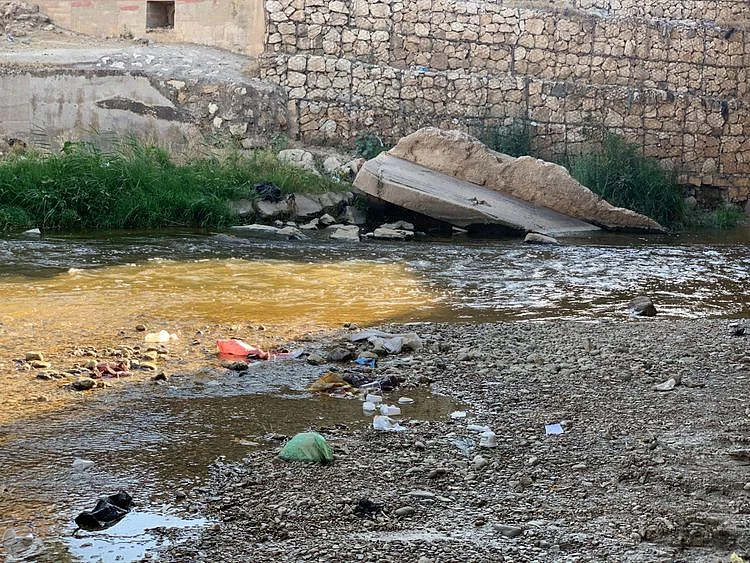Amman: Jordanians remember a time, around 70 years ago, when the Zarqa River was a place for fishing, picnics and small-boat rowing activities.
Now, however, its stench alone causes them to speed along the Amman-Irbid highway.
“No one believes that my family used to live in a tent right by it,” 76-year-old Adel Abu Ghousheh, told Gulf News, as he pointed towards the now-polluted river.
Abu Ghousheh, whose mother and father used to work in a big plantation around 10km from the Zarqa River, reminisced about his childhood alongside it.
“We drank from it and washed our clothes in it. Nothing beats splashing ice-cold water on ourselves after a long day in the fields under the hot summer sun,” he remembered.
But the river is no longer is a source of pride for Jordanians.
Today, the river is heavily polluted, reduced to a blackened, foul-smelling stream strewn with rubbish.
Officials attribute the poor condition of the river to overpopulation as well as mismanagement over the years.
It all started when a wave of refugees fled Palestine during the 1967 War with Israel increasing the population by 300,000 people seemingly overnight.
The river also flows through an area home to more than 85 per cent of Jordan’s industrial plants, which dump their waste into the river.
Once the most important freshwater source for plantations in Amman, Zarqa, Jerash and Irbid, the river’s water is now “gravely unfit for irrigation”, Professor of Biology at the University of Jordan Mohammad Hishawi told Gulf News.
“Any water used to irrigate crops from it in the past have caused severe cases of diarrhoea and other symptoms of infection,” he stated.
Property values in the area have also significantly dropped as a result, according to President of the Jordan Housing Developers Association Zuhair Omari.
Abu Ali Zataymeh, who owns three dunnums (unit of area) alongside the river’s Jerash side, said that he is “stuck” with his lands.
“My dad paid his life’s savings to buy these three dunnums back when this was the most important piece of land in all of Jordan. Now I cannot even sell them, as no one would dare buy them,” he told Gulf News.
The residents of the area, especially throughout the summer months, say the situation is “simply unbearable”.
“It is not just the smell but also the mosquitoes and houseflies that accompany it. We have signed so many petitions and filed so many complaints that I cannot even count by now,” said Mustafa Sa’ad, a university student who lives with his family.
Businesses have also taken a hit.
The Amman-Irbid highway is lined with tree and flower booths that sell freshly-extracted roots and grown trees from the nearby plantations.
The booths located within the river’s stench do not do as well as their competitors.
“People speed up when they pass by our part of the highway. They buy from booths located in either Jerash or Amman where they can shop away from the smell,” Abu Monther Sweilem, an owner of a flower booth directly above the river, told Gulf News.
Now that the government has warned people against fishing or buying anything caught from the river, given its high pollution and presence of toxic materials, it is “impossible for anyone to depend on it for livelihood,” the booth owner added.
The government has received continuous grants, funds, and loans from USAID, the EU, and Germany’s GIZ, and other governmental and non-governmental entities concerned with the river’s environmental state.
The money was directed at the restoration and improvement of the river, with amounts ranging from $50-60 million (Dh183.6-220.3 million) every couple of years.
However, most of the money has gone to expanding the wastewater plants nearby instead of cleaning up the river, Ministry of Irrigation Spokesperson Omar Salameh told Gulf News.
The logic is that cleaning the river will only go so far if the wastewater plants continue to dump into the river.
That is why the money has gone to expanding the plants, Salameh explained.
Citizens have regularly organised cleaning campaigns.
“Unfortunately, their efforts are not enough to save the river,” said a senior municipal official who did not wish to be named.
“We need at least 10 to 15 years of serious work to restore it.”
Sign up for the Daily Briefing
Get the latest news and updates straight to your inbox
Network Links
GN StoreDownload our app
© Al Nisr Publishing LLC 2026. All rights reserved.
